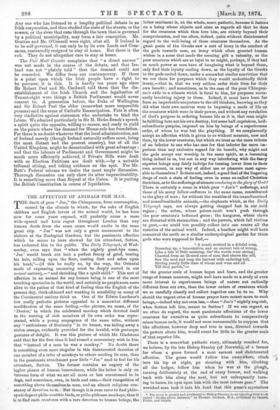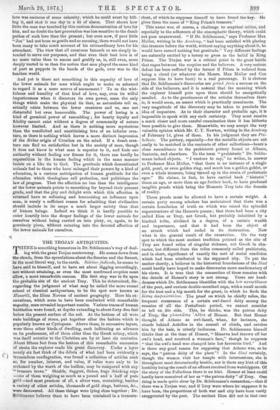THE AFFECTION OF ANIMALS FOR MAN.
THE death of poor "Joe," the Chimpanzee, from consumption, caused by the climate to which, for the sake of English children and English lovers of the animal world, be has been now for some years exposed, will probably cause a more wide-spread and keen regret throughout London than any human death from the same cause would excite in the same great city. " Joe " was not only a great amusement to the visitors at the Zoological Gardens, but the passionate affection which he seems to have showed for his attendant, Sutton, has endeared him to the public. The Daily Telegraph, of Wed- nesday, even says that "when the nightly good-bye came, ' Joe ' would break out into a perfect frenzy of grief, tearing his hair, rolling upon the floor, casting dust and ashes upon his head,"—(if this be really so, by the way, the Oriental mode of expressing mourning must be deeply rooted in our animal nature),—" and shrieking like a spoilt child." This sort of affection in an animal for any human being is one of the most touching spectacles in the world, and certainly no people seem more alive to the pathos of that kind of feeling than the English of the present day, thick-skinned and wanting in sensibility as many of the Continental nations think us. One of Sir Edwin Landseer's few really pathetic pictures appealed to a somewhat different modification of the same feeling,—the picture, we mean, of the 'Doctor,' in which the celebrated monkey which devoted itself to the nursing of sick members of its own order was repre- sented, while a young scapegrace of the same tribe, without any "enthusiasm of Simianity " in its breast, was hiding away a stolen orange, evidently provided for the invalid, with grotesque gestures of delight. It was this picture of which Mr. Gladstone said that for the first time it bad roused a momentary wish in him that "instead of a man he was a monkey." No doubt there is something even more singular in this disinterested devotion of one member of a tribe of monkeys to others needing its care, than in the passionate attachment poor little " Joe " used to feel for his attendant, Sutton. The former contains an augury of the higher phases of human benevolence, while the latter is only an extreme form of what we are all more or less accustomed to in doge, and sometimes, even, in birds and cats,—their recognition of something above themselves in man, and an almost religious con- stancy of devotion to it. But though it is even rarer to find 'kilo- cynic dogs or philo-ornithic birds, or philo-pithecan monkeys, than it is to find such creatures with a rare devotion to human beings, the
latter sentiment is, on the whole, more, pathetic, because it fastens on a being whose objects and aims as regards all that he does for the creatures which thus love him, are utterly beyond their comprehension, and too often, indeed, quite without disinterested regard to the well-being of those creatures themselves. As the great poets of the Greeks saw a sort of irony in the conduct of the gods towards men, an irony which often granted human wishes in a sense that made the seeming gift a calamity, so the poor creatures which are so loyal to us might, perhaps, if they had as much power as men have of imagining what is beyond them, only find their loyalty cooling down, as the loyalty of the Greeks to the gods cooled down, under a somewhat similar conviction that we use them for purposes which they would undoubtedly think ironic,—that is, that we very seldom order their lives for their own benefit ; and sometimes, as in the case of the poor Chimpan- zee's exile to a climate which is fatal to him, for purposes neces- sarily involving injury to them. Indeed, it must have been far from an improbable conjecture to the old thinkers, knowing as they did what their own motives were in imposing a mode of life on the creatures which were in their power, and without any revelation of God's purpose in ordering human life as it is, that man might be fulfilling here not his own destiny, but some half-capricious, half- subordinate purpose, imposed on him by beings of a superhuman
order, of whom he was but the plaything. If we complacently accept an affection which is given to us without measure, now and then, by the lower creatures, but which we treat as the mere tribute of an inferior to one who has uses for that inferior far more im- perious than any exclusive regard for its benefit, why might not the gods accept our worship in the same spirit, as a becoming thing indeed in us, but not in any way interfering with the fancy superior beings may fairly indulge for turning lower lives to their own account, in any way of either use or pleasure most agree.. able to themselves ? Is there not, indeed, a good deal of the lingering dregs of such a state of feeling even in some so.called Christian -doctrines, as to the sufferings of sinners conducing to the glory of God? There is certainly a sense in which poor " Joe's " sufferings, and those of his many fellow-sufferers in the same cause, contributed to the glory of man ; for without the troubles of the unacclimatised and unacclitnatisable animals,—the elephants which, as the Daily Telegraph says, are always getting chapped feet in our cold region ; the cobra, whose poison-teeth won't push through the poor creature's inflamed gums ; the kangaroo, whose claws are distorted with rheumatism ; and the parrots, which fall victims to gout,—we could not possibly collect into one centre all the varieties of the animal world. Indeed, a heathen might well have conceived the earth as a similar anthropological garden for those gods who were supposed to find,— " A music centred in a doleful song, Steaming up, a lamentation, and an ancient tale of wrong, Like a tale of little meaning. tho' the words were strong; Chanted from an ill-used race of men that cleave the soil, Sow the seed and reap the harvest with enduring toil, Storing yearly little dues of wheat and wine and oil Till they perish,"—
for the greater scale of human hopes and fears, and the greater range of human manners, might well have made us a study of even more interest to superhuman beings of nature not radically different from our own, than the lower orders of creatures which we so carefully classify and collect together can be to us. Why should the urgent cries of human prayer have meant more to such beings,—indeed why not even less,—than " Joe's " nightly anguish, when Sutton left him, meant to Sutton ? If we can regard, as we often do regard, the most passionate affections of the lower creatures for ourselves as quite subordinate to comparatively minor human ends, it would not seem unreasonable to suppose that like affections, however deep and true in man, directed towards the powers above him, would count for little in the greater scale of that superior life.
There is a somewhat pathetic story, ultimately vouched for, we believe, by the late Bishop Stanley (of Norwich), of a farmer for wiom a goose formed a most earnest and disinterested affection. The goose would follow him everywhere, climb into his lap at night, go shooting with him, climbing all the hedges, follow him when he was at tbe plough, turning deliberately at the end of every furrow, and walking back with him along the next, but not unfrequently turn- ing to fasten its eyes upon him with the most intense gaze.* The wretched man took it into his head that this goose's mysterious
* The story is quoted and attributed to Bishop Stanley, in an amusing little book called "Stories about Animals," by Thomas Jackson, M.A., published by Oassell, Petter, and Galpin.
love was ominous of some calamity, which he could avert by kill- ing it, and shot it one day in a fit of alarm. That shows how little the man was touched by this curious demonstration of love for him, and no doubt the last generation was less sensitive to the dumb pathos of such love than the present ; but even now, if poor little "Joe" had not been so gentle and so amusing, there would not have been many to take much account of his extraordinary love for his attendant. The view that all creatures beneath us are simply in- tended to serve our purposes, and that even their best love is of no more value than to amuse and gratify us, is, still even, more deeply rooted in us than the notion that men played the same kind of part as puppets in the hands of the gods, ever was to the heathen world.
And yet is there not something in this capacity of love of the lower animals for man which ought to make us ashamed to regard it as a mere source of amusement ? To us the wist- fulness and humility of that kind of love, nay, even its wilful imperiousness when it discovers its own power, seem the only things which make the physical tie that, as naturalists tell us, actually exists between the lower creatures and us, one not distasteful but even honourable. The power of loving is a kind of germinal power of resembling ; for hearty loyalty and fidelity cannot exist without a degree of community of nature however limited. And as there is nothing more mysterious than the unsolicited and uncriticising love of an inferior crea- ture, so there is nothing which leaves a more distinct impression of the divine origin of Creation on the mind. If a dumb crea- ture can find no satisfaction but in the society of man, though it does not know in what man is superior to it, and feels our authority without feeling our fitness for it, there can hardly be superstition in the human feeling which in the same manner insists on a like tie to God. The gratitude which domesticated animals feel to those who have enlarged their powers by a kind of education, is a curious anticipation of human gratitude for the education which theologians call probation, and politicians the law of progress. That the affection no less than the intelligence of the lower animals points to something far beyond their present grade, and that the pity and delight with which this affection is returned have so softening and humanising an influence upon man, is surely a sufficient reason for admitting that civilisation should include in its scope a much larger society than that of human beings. Indeed we think it is hardly possible to enter heartily into the deeper feelings of the lower animals for ourselves without being carried on into piety, or, again, to be genuinely pious, without entering into the devoted affection of the lower animals for ourselves.



































 Previous page
Previous page